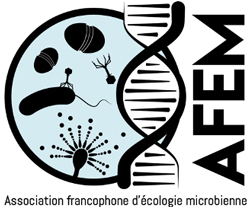Vendredi 26 septembre - Matinée
Espace Pluriel - RdCAccueil des participants
Sessions parallèles
SP28 - Pathogénie microbienne +-
Amphi. A - RdC 
Pathways to Persistence: From Environmental Assaults to Engineered Inhibition
 SP28 - Pathogénie microbienne
SP28 - Pathogénie microbienne
Pathways to Persistence: From Environmental Assaults to Engineered Inhibition
As the climate undergoes changes, so microbes do too. Rising temperatures, shifting ecosystems, and extreme weather events are creating conditions conducive to the proliferation of new and re-emerging bacterial infections.How do microbial communities respond to a warming world?Can we harness their potential to mitigate environmental challenges while addressing the growing threat of infectious diseases? This study aims to explore the hidden power of microbes in the climate crisis and their dual role in shaping our future.
Chairs: Carmen BUCHRIESER & Quentin DUBOIS
- SP28-O.1 - Climate Change and Leptospirosis: An Increasing Zoonotic Threat
Mathieu PICARDEAU (Institut Pasteur, Paris)
Selected short oral presentations
- SP28-1 - Impact of UV Radiation on Airborne Gram-Negative Bacterial Strain: Adaptation and Resilience in Polluted Environments
Madalina ABABII (Laboratoire Communication Bactérienne et Stratégies Anti-infectieuses, Université de Rouen Normandie, Évreux, France) - SP28-2 - Characterization of AI-designed peptides targeting the FtsQBL complex of the cell division machinery in Escherichia coli
Pauline RÉMONT (Structural Bioinformatics Unit, Institut Pasteur, Université de Paris Cité, CNRS UMR3528, Paris, France) - SP28-3 - Lysine acetylation in Acinetobacter baumannii pellicles
Solenn SOULIGNAC (Polymers, Biopolymers, Surfaces, Laboratory UMR 6270 CNRS, University of Rouen Normandie, INSA Rouen Normandie, Mont-Saint-Aignan, France)
SP29 - Virologie +-
Salle F1/F2 - 1er étage
Infections en transplantation
SP29 - Virologie
Infections en transplantation
Les infections post-transplantation sont fréquentes, en lien avec l'immunosuppression post-greffe, et exposent le patient à un risque accru de morbidité et mortalité, notamment dans les premiers mois. Les outils diagnostiques conventionnels ne pas toujours suffisants et les possibilités thérapeutiques sont limitées. L'association de biomarqueurs immunologiques aux outils microbiologiques est une stratégie prometteuse pour mieux identifier les patients à risque. Dans cette session, nous présenterons les travaux visant à étudier la physiopathologie de ces infections post greffe, et évaluer de nouveaux biomarqueurs, pour la prise en charge de ces infections.
Modérateurs : Céline BRESSOLLETTE-BODIN & Aurélien AUBRY
- SP29-O.1 - Prise en charge du CMV en transplantation rénale
Hannah KAMINSKI (CHU de Bordeaux)
Communications orales courtes sélectionnées
- SP29-1 - Développement et évaluation d'un nouveau test de détection antigénique du BK Polyomavirus post-transplantation rénale
Baptiste DEMEY (Laboratoire de Virologie CHU Amiens-Equipe AGIR (UR4294), Amiens, France) - SP29-2 - Prédiction du risque de réplication BK Polyomavirus par analyse combinée des profils d’anticorps neutralisants de donneurs/receveurs de greffe rénale
Morgane SOLIS (Laboratoire de Virologie, Hôpitaux Universitaires de Strasbourg, Strasbourg, France) - SP29-3 - Infections disséminées à Adenovirus D8 lors d’une épidémie de conjonctivites en Unités de Soins Intensifs de pédiatrie
Berthe-Marie IMBERT (Virologie, CHU Nantes, Nantes, France) - SP29-4 - Efficacité et tolérance de l’amenamevir dans la prise en charge des infections à HSV-1 résistantes à l’acyclovir chez neuf patients immunodéprimés.
Jérôme LE GOFF (Virologie, Hôpital Saint-Louis, Paris, France)
SP30 - Microbiologie clinique +- Parcours formation continue - Session Qualiopi
Amphi. C - RdC
Microbiome : Il n’y a pas que les bactéries dans la Vie (avec le GT MICMAC)
SP30 - Microbiologie clinique
Microbiome : Il n'y a pas que les bactéries dans la Vie (avec le GT MICMAC)
Le mycobiome, qui fait partie du microbiome humain (incluant le bactériome et le virome), appartient à la biosphère rare de ce dernier. L'étude du mycobiome présente des difficultés techniques spécifiques, quelle que soit l'approche employée : extraction, charge fongique faible, bases de données limitées et non exhaustives, etc. Malgré des charges et diversités fongiques inférieures aux charges et diversités bactériennes, les autres composantes du microbiome (hors bactériome) semblent jouer un rôle dans l'homéostasie humaine, apportant un éclairage nouveau sur la compréhension de certaines maladies et fonctions physiologiques.
Modérateurs : Maxime PICHON & Mathilde GAY
- SP30-O.1 - Place du mycobiome au sein du microbiome : Méthodes d’analyse et Intérêt clinique
Laurence DELHAES (Université de Bordeaux)
Communications orales courtes sélectionnées
- SP30-1 - Suivi métabolomique des acides gras à chaines courtes au niveau respiratoire chez les patients intubés-ventilés
Tom BENOIST (UMR INSERM 1092 RESINFIT, Université de Limoges, CHU de Limoges, Limoges, France) - SP30-2 - Caractérisation du microbiote fonctionnel et du métabolome pulmonaires chez des patients atteints de légionellose
Marine IBRANOSYAN (CNR des Légionelles / Plateforme genEPII, Hospices Civils de Lyon, Lyon, France) - SP30-3 - Relationship between oral microbiota and oral health: Toward predictive microbial signature of oral dysbiosis
Morgane ORTIS (MICORALIS Laboratoire, Faculté de Chirurgie Dentaire, Université Côte d'Azur, Nice, France) - SP30-4 - Evaluation of preventive treatments for intestinal mucositis in a murine model using Lacticaseibacillus rhamnosus L156.4
Gabriela MUNIS CAMPOS (UMR1253-STLO, INRAE / Institut Agro, Rennes, France)
SP31 - Biotechnologies microbiennes +-
Salle E1/E2 - 1er étage 
 Modeling and Artificial Intelli- gence: Exploring New Frontiers in Microbial Biotechnology and Metabolic Engineering (in association with FFBiotech)
Modeling and Artificial Intelli- gence: Exploring New Frontiers in Microbial Biotechnology and Metabolic Engineering (in association with FFBiotech)
 SP31 - Biotechnologies microbiennes
SP31 - Biotechnologies microbiennes
Modeling and Artificial Intelligence: Exploring New Frontiers in Microbial Biotechnology and Metabolic Engineering
Advances in mathematical modeling and artificial intelligence (AI) are opening new avenues for understanding, predicting, and controlling microbial metabolism. This session will explore how these tools can revolutionize microbial biotechnologies by optimizing industrial processes such as anaerobic digestion and bioproduct production. The session will provide an overview of these interdisciplinary approaches and the associated innovation prospects, offering insights into future challenges and opportunities for understanding, mastering, directing, and controlling microbial metabolisms in pure and mixed cultures.
Chairs: Théodore BOUCHEZ & Simon LABARTHE
- SP31-O.1 - Artificial intelligence for closed-loop microbiome control: development perspectives
Daniel RIOS GARZA (INRAe, Antony) - SP31-O.2 - Modeling Microbial Communities: Toward Digital Twins
Simon LABARTHE (INRAe / INRIA, Cestas)
Selected short oral presentations
- SP31-1 - Thermodynamic-based modeling of syntrophic organic acid oxidation in anaerobic digestion
Sahak YEGHIAZARYAN (LBE, INRAE, Narbonne, France) - SP31-2 - Improvement of the constraint-based modeling tool for the metabolic optimization of Bacillus and the production of lipopeptides from agro-resources
Francesco ROPPO (UMRt 1158 BioEcoAgro, Université de Lille, Villeneuve-d’Ascq, France)
SP32 - Innovations pédagogiques +-
Salle H1/H2 - 1er étage
L’étudiant(e) au cœur de l’innovation pédagogique ?
SP32 - Innovations pédagogiques
L’étudiant(e) au cœur de l’innovation pédagogique ?
Dans cette session pourront être présentés tous travaux relatifs aux questionnements pour améliorer les techniques utilisées dans les enseignements en Microbiologie fondamentale et médicale.
Modérateurs : Sylvain MEYER & Mathilde LESCAT
- SP32-O.1 - Ecotrophelia : comment un concours étudiant sert de laboratoire-test pour des Innovations pédagogiques
Thomas HABERSETZER (AGIR, Talence)
Communications orales courtes sélectionnées
- SP32-1 - Enseigner par la recherche : Découverte et caractérisation de bactériophages par des étudiants en licence à l'Université Paris-Saclay
Ombeline ROSSIER (Institut de Biologie Intégrative de la Cellule, Université Paris-Saclay, Gif-sur-Yvette, France) - SP32-2 - Des virus au service de la pédagogie : intégrer les phages pour mieux enseigner la microbiologie
Claire LE HÉNAFF LE MARREC (UMR 1366 Oenologie, Bordeaux INP, ISVV, Villenave-d’Ornon, France) - SP32-3 - Prévention des infections materno-fœtales : une thématique pilote dans le cadre du service sanitaire
Hélène FAURY (Laboratoire de Microbiologie, AP-HP, Hôpital Necker Enfants malades, Paris, France) - SP32-4 - Enquête épidémiologique, « de la fourche à la fourchette » : un jeu de rôle immersif pour renforcer les compétences en santé publique vétérinaire
Narjes MTIMET (Hygiène Qualité Sécurité des Aliments (HQSA), Ecole Nationale Vétérinaire d’Alfort (EnvA), Maisons-Alfort, France) - SP32-5 - Comment améliorer l’adhésion des étudiants en filières paramédicales aux enseignements magistraux en hygiène-infectiologie ?
Camille CHAGNEAU (Laboratoire Bactériologie-Hygiène, CHU Toulouse, Toulouse, France) - SP32-6 - Germ Connect : un serious game polyvalent pour mobiliser ses connaissances en microbiologie médicale
Maud SALMONA (Laboratoire de Virologie, Hôpital Saint-Louis AP-HP, Université Paris-Cité, Paris, France)
SP33 - Environnement +-
Salle D1/D2 - 1er étage
 Microbiote des plantes : des racines jusqu’aux feuilles (en association avec l’AFEM)
Microbiote des plantes : des racines jusqu’aux feuilles (en association avec l’AFEM)
SP33 - Environnement
Microbiote des plantes : des racines jusqu’aux feuilles
Le microbiote des plantes : depuis leurs racines jusqu'à leurs parties aériennes, les plantes sont habitées par des micro-organismes. Dans cette session, nous découvrirons quels types d'interactions existent entre plantes et microorganismes ou encore si certains micro-organismes peuvent être utilisés pour une agriculture plus verte…
Modérateurs : Céline ROOSE-AMSALEG & Alain BLANCHARD
- SP33-O.1 - Mining Above- and Belowground Microbiomes to Identify Microbial Biomarkers of Grapevine Health and Yield
Corinne VACHER (INRAe, Bordeaux, France)
Communications orales courtes sélectionnées
- SP33-1 - Monitoring the establishment of a synthetic microbial community with a potential biocontrol activity against grapevine downy mildew using a microfluidic qPCR chip
Manon CHARGY (INRAE, Villenave-d’Ornon, France) - SP33-2 - Impact of landscape context and arthropods on grape berry microbiota assembly
Yolaine FOUGEROUSSE (UMR Oenologie, ISVV (Institut des Sciences de la Vigne et du Vin), Villenave d’Ornon, France) - SP33-3 - Rôle des bactéries solubilisatrices de phosphates dans le microbiote des plantes : influence des couvertures végétales sur leur densité et leur activité
 Ranjivah Frandley RANDIMBIZAKA (École Doctorale de Genies des Vivants et de Modélisation, Université de Mahajanga, Mahajanga, Madagascar)
Ranjivah Frandley RANDIMBIZAKA (École Doctorale de Genies des Vivants et de Modélisation, Université de Mahajanga, Mahajanga, Madagascar)
- SP33-4 - Proteomics and genomics of metalloresistant bacterial endophytes interacting with pseudometallophytes
Maxime MARCQ (Protéomique et microbiologie, Université de Mons, Mons, Belgique)
Espace Pluriel - RdCPause café - Visite de l’exposition - Posters
Espace Pluriel - RdCSESSION POSTERS affichés 2 - Numéros pairs
SESSION POSTERS commentés 2
Modérateurs : Olivier DUSSURGET & Marion DUTKIEWICZ
Pour voir la liste des posters commentés : cliquer ici
Sessions parallèles
SYMPOSIUM
Amphi. A - RdC
 Modérateurs : Jérôme LE GOFF & Céline BRESSOLLETTE-BODIN
Modérateurs : Jérôme LE GOFF & Céline BRESSOLLETTE-BODIN
CSL Seqirus - Le patient de 65 ans et plus : intérêt d’une nouvelle approche vaccinale
-
Partie 1 - La grippe chez les personnes de 65 ans et plus
Élodie BLANCHARD (CHU de Bordeaux) -
Partie 2 - Nouvelles recommandation HAS sur la vaccination antigrippale les personnes de 65 ans et plus
Bertrand FOUGÈRE (CHU de Tours)
SYMPOSIUM - Bactéries Hautement Résistantes Émergentes (BHRe)
Amphi. C - RdC
 Modérateurs : Frédérique LARTIGUE & Alban LE MONNIER
Modérateurs : Frédérique LARTIGUE & Alban LE MONNIER
Mathilde LESCAT (IRBA, Brétigny-sur-Orge)
- Enquête nationale sur les pratiques de diagnostic des BHRe dans les laboratoires d’analyses médicales
Philippe GLASER (Institut Pasteur, Paris)
- Décrypter l’évolution des entérobactéries multirésistantes pour comprendre leur émergence
Sessions plénières
Conférence plénière
Amphi. A - RdC 
+-
Delphine DESTOUMIEUX-GARZON
Descriptif à venir.
Modératrices : Carmen BUCHRIESER & Valentine BERTI
Delphine DESTOUMIEUX-GARZON (Ifremer, CNRS, Montpellier)
- Resistance and Virulence in Vibrio from European Coastal Environments: Impacts of Seasonal Variations and Climate Change
Annonce des prix
Espace Pluriel - RdCDéjeuner - Visite de l’exposition - Posters
09/09/2025

